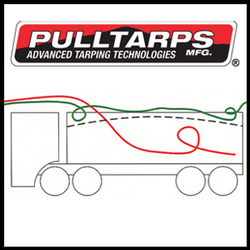Jul 21 2008
Truckers may not be able to do anything about the rising price of gasoline, but they can cover their load with a tarp to help lower fuel costs. Research shows that using a tarping system can improve the fuel usage of dump trucks by 3 to 9 percent. The study was jointly conducted by UK-based tipping gear manufacturer HARSH Ltd. and MIRA, a leading international provider of product engineering, research and testing.
 Fuel savings!
Fuel savings!
In a series of tests, the companies proved that covering a truck's bed with sheeting helps to maintain optimum airflow over the rest of the vehicle. By maximizing the truck's operating performance can lower fuel usage--whether the truck is carrying a load or empty.
"This is a huge opportunity for truck fleets and individual drivers to save money and create a positive response by enhancing the public's safety at the same time," said William McRea CEO of Pulltarps Manufacturing Inc. "Drivers can advertise that they are tarping up their dump trucks for 'your safety and to save fuel.'"
While the compelling research was conducted by a UK company, the principle is universal and applicable anywhere. Trucking companies in the United States can also use a tarping system to save fuel and money, according to McRea. "At current fuel costs, most tarps systems offered by Pulltarps Manufacturing Inc. will pay for themselves within six months," he said.
Pulltarps, manufactures a line of American-made tarping systems for the dump truck and hauling industry. All of the company's products are made at its California plant by in-house engineering experts. "This ensures the uniformity and high quality of every part," McRea said.
For more information on trucks, click here.